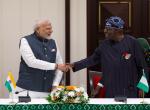Present-day Relations
Indo-Israeli relations are on the upsurge. Leaders of both the countries have no qualms in accepting the ever-increasing bonhomie between the countries under the two governments. Till recently, it was mostly the defence ties which grabbed the attention but the current scenario ushers in a new level of political engagements which is facilitating the expansion of the overall relationship. If this happens, it could take the ties between the two states to new heights. Along with this comes the burgeoning cooperation in the field of agriculture, culture, academics, science and technology. Economic ties, which are running considerably well, will likely get further boost if the Free Trade Agreement (FTA) is signed in the near future. As it is, the value of bilateral trade reached US$ 4.52 billion (excluding defence) in 2014.1 It is apparent that Narendra Modi is likely to create a history by becoming the first Indian Prime Minister to visit Israel in the very near future.
The increasing visits of top-level Indian leaders, beginning with that of the Home Minister Rajnath Singh in November 2014, President Pranab Mukherjee in October 2015, and the latest by the External Affairs Minister Sushma Swaraj in January this year are clear manifestation of the importance attached towards the politically stable, militarily-technologically advanced and an economically strong country. Neither of the two countries remains inhibited from showcasing their fondness for each other. It is indeed “coming-out-of-the-closet”, and finds no problem in discussing their mutual strategic interests. Moreover, from his “sky is the limit” comment in 2014, Israeli Prime Minister Benjamin Netanyahu went on to say that the “future of Indo-Israeli ties is limitless” during the visit of India’s head of the state.2 With such pronouncements, it has become easier for both the countries to strengthen one of the main locomotives of relations-defence ties. The nature of arms deals signed over the last one year is the evidence. This article briefly highlights some of the latest developments in this sphere.
Defence Ties
Gone are the days when it was considered a taboo to talk about the defence ties between Israel and India. Leaders of both the countries are not shying away from admitting the strength of the current ties. Even the Israeli ambassador to India, Daniel Carmon, in March last year, said, “We’re not shy, ashamed”, to speak of the expanding (defence) ties. This January, he again reiterated, “The defence cooperation for many years has been central pillars of the relationship. The changing world, changing parameters, changing needs are always something that is on the top of our agenda and always on our radar”.3 Furthermore, the visit of Defence Minister Moshe Ya’alon to India last February became a landmark event as he acknowledged the importance of India to Israel’s defence industries, and underscored his country’s willingness to share technology and expertise. This visit is believed to have boosted the co-production of weapons systems between the two governments and private enterprises. As a result, defence cooperation comes with a complete package-arms trade soaring high, counter-terrorism cooperation likely to be augmented and, joint-venture (JV) and co-production programmes gaining significant momentum.
Arms Trade: Global and Indian Perspective
By becoming the largest arms client for Israel, India has contributed significantly in sustaining the former’s status as one of the biggest weapons exporting countries in the world. This has come at the right juncture when Israel’s arms sales values dropped during 2013 and 2014 due to factors such as reduction in the defence budgets and military acquisition programmes in the United States (US) and Europe. Currently, Asia-Pacific region alone is the largest purchaser of Israeli-manufactured arms and the export value for the year 2014 was estimated at US $ 3 billion out the total value of US $ 5.6 billion.4 In 2012 and 2013 too, this region bagged the top position by importing arms worth US $ 4 billion and US $ 3.91 billion, respectively. Asian defence markets, including India, South Korea, Singapore, Vietnam and Philippines (on the rise) are proving to be lucrative for Israel. Prevailing domestic and territorial disputes, threats from their hostile neighbours and defence indigenisation programmes in these countries are some of the factors which could be attributed for the rising arms and military technological imports from a country like Israel.
The value of the Indo-Israeli arms trade over the last one decade is estimated at US $ 10 billion. At present, the import of Israeli arms is valued at US $ 1.0–1.5 billion annually. Table below gives the figure for three years.
Defense Equipments Imported from Israel (in Rs. Crores)
| 2011-2012 | 2012-2013 | 2013-2014 |
| 1296.21 | 774.54 | 1234.65 |
Source: Lok Sabha5
Israel has carved its niche in India by supplying some of the most sought-after weapons systems, with the exception of bigger platforms, such as aircraft. Missile, anti-missile systems, UAVs, reconnaissance technologies, electronic warfare systems (EWS), avionics, arms and ammunition are the major components of its arms transfers. The importance to Indian defense market was signified when Israel sold Phalcon Airborne Warning and Control Systems (AWACS), equipped on Russian-built Ilyushin II-76s, in May 2009 and March 2010 at a cost of US$1.1 billion. As an addition to the three operational AWACS, two more are expected to join the Indian Air Force (IAF). This technology was denied to China under the intense pressure of the US.
Since the last two years, both the countries signed a few important arms deals. India’s announcement of the procurement of the Israel Aerospace Industries (IAI) Barak-1 anti-missile defense (AMD) systems in September 2014 represented the first major deal done with Israel under the Modi-led government, only months after taking power. Though the framework for this deal, worth $144 million, was laid down by the previous UPA regime, this was considered similarly vital by the present government in order to address the depleted defensive capabilities of Indian warships and the fast-depleting stockpile of the Indian Navy’s anti-ballistic missiles. A month later, India’s Defense Acquisition Council finalized its decision to buy 8,356 Israeli-made Spike anti-tank guided missiles (ATGMs) and 321 launchers at a cost of US $ 525 million. The deal has finally made some headway as the negotiations were stalled due to cost issues. This is particularly a significant deal as it happened after facing a stiff competition from the US-made Javelin missile. The US put in considerable efforts to tap the lucrative Indian market by promoting its groundbreaking defense product, but unresolved issues in relation to military-technology transfer mechanisms saw India opt for the Spike. That said Israel need not be complacent as this deal provided clear indications as to India’s interest not only in procuring finished products, but also in acquiring technology for its defense indigenization programs. This is in conjunction to the ‘Make in India project’ which was launched in September 2014. It, however, will be a competing factor to Israel if other mega arms vendors agree to transfer technologies along with finished products to India.
Furthermore, the Indian government cleared for the procurement of ten armed Heron TP UAVs worth US$400 million from Israel, which will likely enhance reconnaissance and surveillance capabilities of its armed forces. As it is, India operates a total of 176 “Israel-made drones including 108 IAI Searchers and 68 unarmed Heron-1 aircraft for surveillance and reconnaissance missions”.6 IAF has a fleet of IAI-made Harpy drones. Before the visit of the India PM, one might get to see an arms deals signed with Israel for the purchase 164 laser-designation pods, also known as 'Litening-4', for Indian Air Force fighters like Sukhoi-30MKIs and Jaguars and 250 advanced 'Spice' precision stand-off precision-guided bombs (Rafael-manufactured), at a whopping cost of US$3 billion.7
Counter-terrorism Cooperation
Terrorism is a common phenomenon facing by both the countries; as a result, counter-terrorism cooperation receives heightened attention. Therefore, apart from traditional arms trade, border fencing technologies have increasingly emerged as important component of exports to India. Such equipments are being used along the Line of Control in Jammu and Kashmir (J&K). For instance, during the mentioned visit of the Home Minister, Netanyahu expressed said that Israel was "ready and willing" to share with India its technology for border protection. More cooperation is expected in this sphere due to rising instances of cross-border infiltration, particularly after the ill-fated Pathankot attack in early January. In the light of this, intensifying counter-terrorism cooperation, beside several other security-related issues, became the top agenda of discussion during Sushma Swaraj’s visit. While it is not feasible to deploy certain counter-terrorism tactics deployed by Israel Defense Forces, India can at least speed up its purchase of border-protection technology from Israel and make effective use of them. The possibility of erecting Israel-type of secured fencing (as discussed recently) along the Indo-Pak border should be explored without further delays.8 Alongside this, sharing of information and intelligence gathering are given utmost priority.
Co-production
Beyond mere seller-buyer relationship, military cooperation is well-extended towards collaborations and joint research. Co-production and JV are other important dimensions of Indo-Israeli arms trade. This is mainly carried out between India’s Defense Research and Development Organization (DRDO), Israeli Aerospace Industry (IAI) and a few other Israeli firms, for the development of long and medium-range surface-to-air missiles and various EWS, avionics and homeland security countries. Both the countries recently achieved a commendable success when their jointly-developed Barak-8 LR-SAM (with a range of 70 kilometers) was test-fired in December last year. Now, there is a possibility that manufacturers will likely get orders from other armed forces which need such long-range systems.
More headway is now expected as a few private-owned Indian and Israeli firms agreed to collaborate. For example, in February 2015, Kalyani Group and Rafael signed an agreement to form a JV to develop and manufacture high-technology systems for the Indian defense sectors, involving missile technology, remote weapon systems and advanced amour solutions.9 Further, India-based Premier Explosives signed a Memorandum of Understanding (MoU) with IAI in this January, and is likely to be in the field of missile systems. And, the latest addition to the list is the establishment of a 51:49 JV between Punj Lyoyd and Israel Weapons Industries (IWI) for the manufacture systems such as Tavor assault rifles and Uzi sub-machine gun. During the first phase, components of the gun (about 80 percent) will be manufactured in India and export to Israel, and followed by full production here in the country for supplying to the security forces.10 The transfer of technology from Israel will likely enable the Indian firm to manufacture a wide range of products, and this will be a stepping stone to the defense indigenization process in the country to attain self-sufficiency.
Conclusion:
Considering the developments, the future of Indo-Israeli arms trade looks very promising, and they are set to grow. India’s quest for its own technological advancement in the defense industry provides the single biggest incentive to expand its ties with this Middle Eastern country. Given India’s slow-paced defense indigenization programs, Israel will, in all likelihood, remain one of the most-important sources some of its military requirements. However, if the clauses around technology transfer (as emphasized by the Indian PM) will be viewed as an increasingly important factor in India’s arms trading, Israel is unlikely to get preferential treatment. Moreover, due to rising security demands, India may diversify its sources of arms imports, and in this process, any competition to Israel from other vendors should be ruled out. However, considering the shared national security challenges, defense ties between the two countries will continue to remain the mainstay of the bilateral relationship.
Endnotes:
1 “India-Israel Economic and Commercial Relations”, Ministry of External Affairs, New Delhi, http://www.indembassy.co.il/pages.php?id=14#.Vrghdhh96t8
2 “Future Ties with India are Limitless, Says Israeli PM Benjamin Netanyahu”, NDTV, 15 October 2015, http://www.ndtv.com/india-news/future-ties-with-india-are-limitless-says-israeli-pm-benjamin-netanyahu-1232631
3 “Modi diplomacy: Israel can finally talk about defence interests with India”, The Indian Express, 16 January 2016, http://indianexpress.com/article/explained/modi-diplomacy-israel-can-finally-talk-about-defence-interests-with-india/
4 Gili Cohen, “Israeli Arms Exports Down $1 Billion in 2014”, Ha’aretz, 21 May 2015, http://www.haaretz.com/israel-news/.premium-1.657613
5 “Details of Defence Equipment Imported from Major Countries”, Lok Sabha, 28 November 2014, http://164.100.47.132/Annexture_New/lsq16/3/as83.htm
6 Franz-Stefan Gady, “India’s Air Force to Get10 Killer Drones from Israel”, The Diplomat, 15 September 2015, http://thediplomat.com/2015/09/indias-air-force-to-get-10-killer-drones-from-israel/
7 Rajat Pandit, “Fresh push for Israeli missile system”, The Times of India, 9 February 2016, http://timesofindia.indiatimes.com/india/Fresh-push-for-Israeli-missile-system/articleshow/50909202.cms
8 “Govt mulls Israel-type fencing along Pakistan border”, The Indian Express, 24 January 2016, http://indianexpress.com/article/india/india-news-india/govt-mulls-israel-type-fencing-along-pakistan-border/
9 “Kalyani Group Announces JV with Rafael Advanced Defence Systems to develop and manufacture high technology systems for the defence sector”, Press Release, Kalyani Group, 19 February 2015, http://www.kalyanigroup.com/Final%20Press%20Release%20Kalyani%20Group%20Rafael%20JV.pdf
10 Sushant Singh, “Israeli-Indian JV to make small arms in private sector”, The Indian Express, 4 February 2016, http://indianexpress.com/article/business/business-others/israeli-indian-jv-to-make-small-arms-in-private-sector/
Published Date: 15th February 2016, Image Source: http://www.dnaindia.com
(Disclaimer: The views and opinions expressed in this article are those of the author and do not necessarily reflect the official policy or position of the Vivekananda International Foundation)










Post new comment